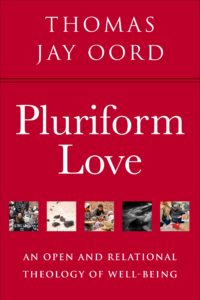Thomas Jay Oord, the founder of the Center for Open and Relational Theology, has written a new book on love. He reports that after having published some 25 books, his wife asked, “Another book on love?!”

This one, Pluriform Love, is his doctoral thesis revisited, and it pulls together many of the threads that have led to the founding of the Center for Open and Relational Theology. It gives a wide overview of themes Oord has visited before in his focus upon with God’s Uncontrolling Love.
Although not primarily a summary of biblical scholarship, Dr. Oord takes the care with biblical texts that one would expect from a person who was steeped in scripture at the heart of the life of the Christian community in which he was raised. One will not find here references to the way these texts impact the unfolding pastoral stories of persons holding various faith stances, but one will find a clear argument for Dr. Oord’s theological perspective, along with copious footnotes to guide the reader to a breadth and depth of scholarly theological work.
His outline clearly reveals his aim toward “Pluriform Love.” His audience is primarily Christians who grew up with the “Old” and the “New” Testaments. Love, despite its importance in scripture, is not at the heart of most theologies.
The book unfolds Oord’s definition of love: “To love is to act intentionally, in relational response to God and others, to promote overall well-being.” He uses the term “well-being,” because it reflects both a biblical perspective and contemporary notions.
It has been popular in many Christian communities to downplay eros (desire) and to give precedence to agape (self-sacrificing love). He uses analysis of Anders Nygren’s theology as a foil to clarify agape, which is doing good and loving essentially “in spite of” the situation of the lover and the loved.
He uses Augustine to clarify eros, a love that is “because of” some particularly luring desire. He invents his own term, amipotence, to express the essential kenosis that is involved in his “open and relational” theology. The “uncontrolling” God is not to be seen as “omnipotent,” but as “amipotent.” Oord has coined this term, combining the Latin prefix in amity, amigo, amicable, with the Latin root for “potency” and “potential.” He sees this as reclaiming the importance of love in the Judaeo-Christian scriptures as “hesed,” or “alongside of” Love.
In the discussion, he offers the open and relational critique of classical theism which has been a frequent theme in Dr. Oord’s writings. Whether you have read many of Tom Oord’s previous works, or you are coming fresh to the conversation, you’ll find in Pluriform Love a deep dive into a theological approach that has made Oord such a popular theological writer and founder of a Center and a doctoral program in Open and Relational Theology.

